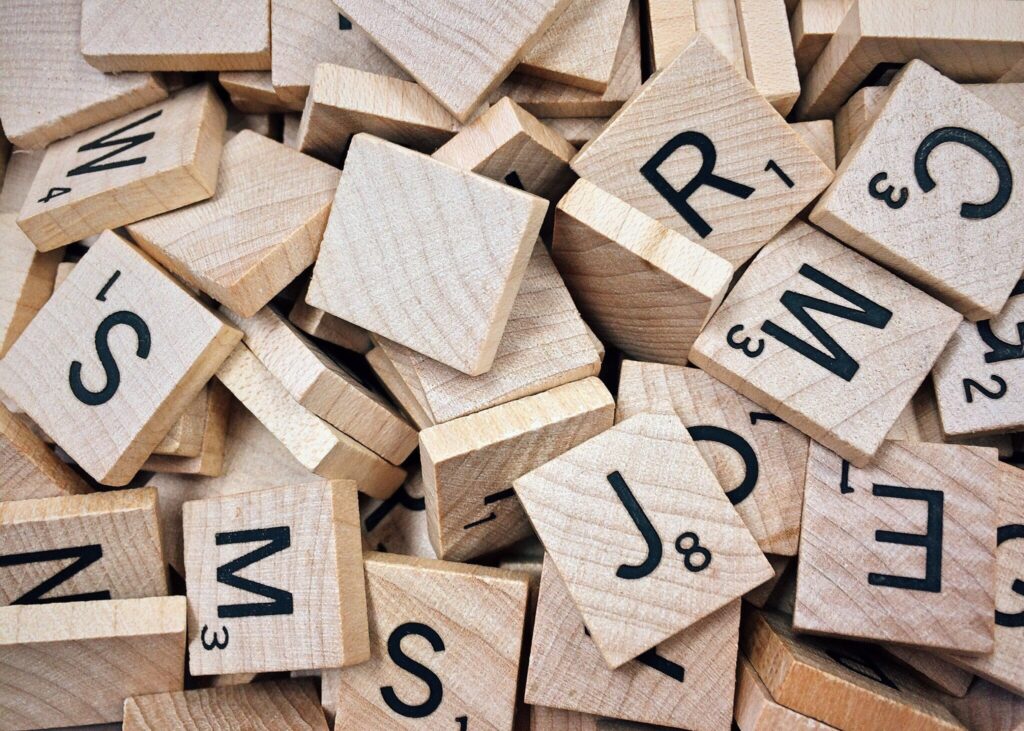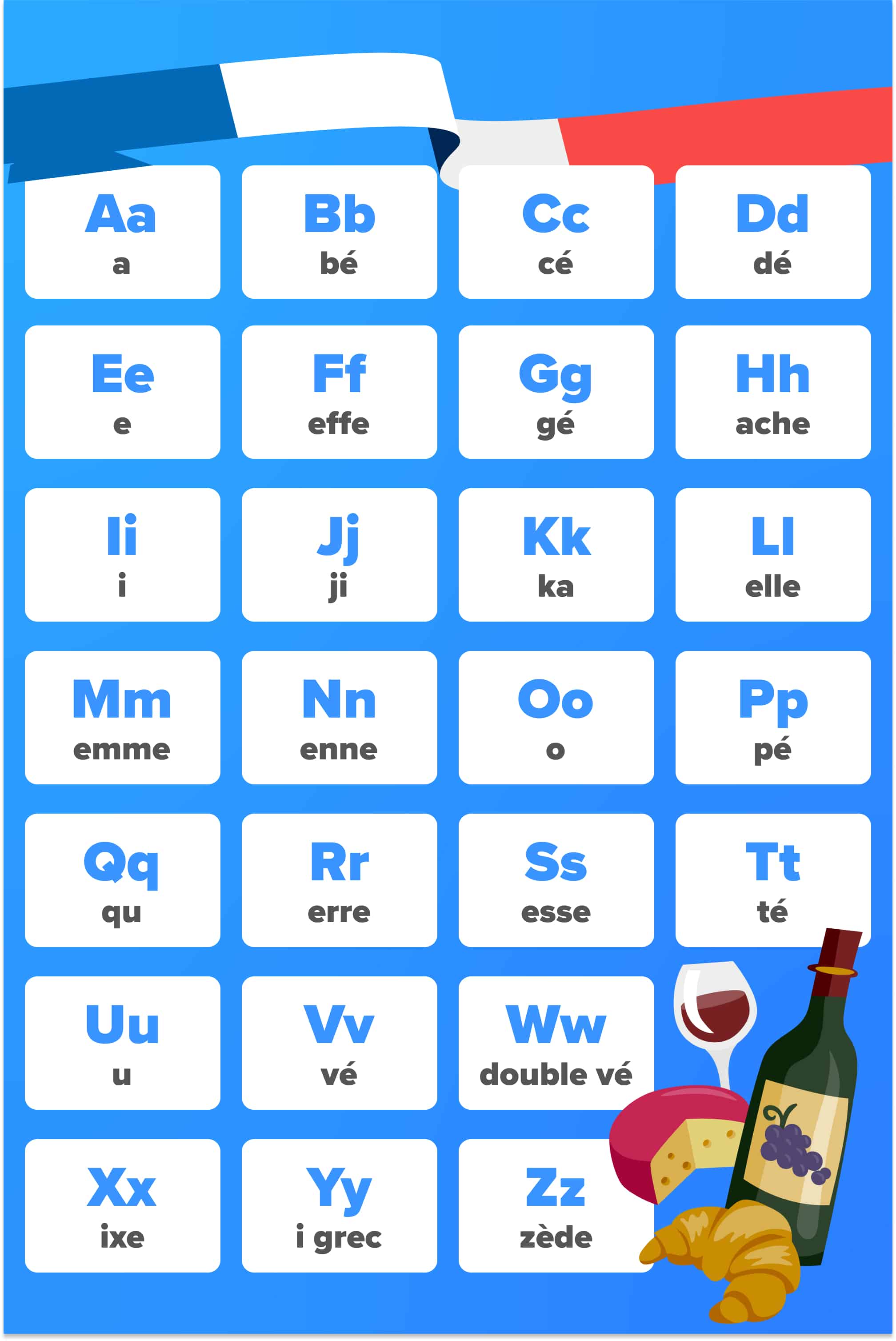
Your Complete Guide to the French Alphabet (With Audio Pronunciation)
It doesn’t matter whether you’re learning French to chat with native speakers or stream that new comedy in the original language.
You’ll need to start from the very beginning to accomplish both goals, and learning the French alphabet is key to this.
With this basic rundown on the French alphabet, I’ll have you laughing with locals or in front of your laptop screen in no time.
Contents
- The Alphabet in French
- Letters with Accents in French
- The Most Important Letters to Master in French
- Common Vowel Pairs in French
- Learning the French Alphabet Song
- And one more thing...
Download: This blog post is available as a convenient and portable PDF that you can take anywhere. Click here to get a copy. (Download)
The Alphabet in French
What are the 26 letters of the alphabet in French? Luckily for you, English and French both use the Roman alphabet. As a result, when English speakers start learning French, it’s easy to dive headfirst into learning vocabulary and conjugation. Because why would you spend time learning the mechanics of a writing system you already know?
However, bypassing this fundamental step will come back to bite you later as you struggle to pronounce common vowel pairings and accented letters that are staples to the French language. As tedious as it sounds, reviewing the basics will spare you some problems later.
| Letter | Name | Example |
|---|---|---|
| A | a | ami (friend) |
| B | bé | bon (good) |
| C | cé | chien (dog) céleri (celery) |
| D | dé | danse (dance) |
| E | e | enfant (child) |
| F | effe | famille (family) |
| G | gé | grand (big) géographie (geography) |
| H | ache | hiver (winter) |
| I | i | île (island) |
| J | ji | jeu (game) |
| K | ka | kiwi (kiwi) |
| L | elle | lumière (light) |
| M | emme | maman (mom) |
| N | enne | noir (black) |
| O | o | océan (ocean) |
| P | pé | papier (paper) |
| Q | qu | quart (quarter) |
| R | erre | rouge (red) |
| S | esse | sac (bag) |
| T | té | table (table) |
| U | u | université (university) |
| V | vé | ville (city) |
| W | double vé | wagon (wagon) |
| X | ixe | xylophone (xylophone) |
| Y | i grec | yaourt (yogurt) |
| Z | zède | zèbre (zebra) |
Letters with Accents in French
Earlier, I said that English and French both share the Roman alphabet. However, French differs from English by also using accents on some of its letters. Accents in French are critical, as they have the power to alter the pronunciation or overall meaning of a word.
The French language uses five accents:
- The acute accent, or l’accent aigu , which is only used on the letter “E” (É,é). It’s drawn pointing towards the right—think of the forward slash mark on a keyboard. When used, it produces a shortened “ay” sound, like in the word école (school).
- The grave accent, or l’accent grave , which is often confused with the acute accent. The key difference is that a grave accent is drawn pointing towards the left, much like a backslash mark on a keyboard. Additionally, this accent can be used over the letters “A” (À,à), “E” (È,è) and “U” (Ù,ù). But you’ll only hear a difference in pronunciation on the letter “E,” where it creates an “eh” sound, like in the word crème (cream).
- The cedilla, or l’accent cédille , is the only accent that is not applied to a vowel. It appears on the letter “C” (Ç,ç), resulting in the letter being pronounced like the letter “S.” In French, the letter “C” makes a hard sound when it precedes the letters “a,” “o” and “u.” So you’ll only ever see and use a “C” with a cedilla in front of these vowels to indicate that it should be pronounced with a soft sound. Case in point, note the use of the accent in the word français (French), but not in the word merci (thank you).
- The circumflex, or l’accent circonflexe , is the only accent that can be applied to all of the vowels. Despite this, it will only change the pronunciation of the letters “Â,” “Ê” and “Ô.” The letter “” is pronounced similar to “ah,” but you have to open your mouth slightly wider and drop your voice a little. You can hear this accent in the word château (castle/palace). The letter “Ê” is pronounced like “È,” making an “eh” sound, like in the word crêpe (crepe/pancake). Saying the letter “O” or the exclamation “oh” is the correct pronunciation for “Ô,” as in côte (coast/rib).
- The diaeresis, or l’accent tréma , is used for words where there are two vowels next to each other. The accent is written over the second vowel to indicate that each vowel will create two independent sounds, as opposed to forming a vowel pair and making one sound. For this reason, the word naïve is pronounced as two syllables, not as one.
For a more in-depth look at French accent marks, you can check out this post.
The Most Important Letters to Master in French
Because English and French share an alphabet, you won’t find a dramatic difference in pronunciation among most of the letters. However, there are a few letters in French that require extra attention. Practicing these letters will ensure that you don’t mispronounce simple words and will help you start developing that French accent.
- C : Just like in English, the letter “C” has a hard and soft sound. You’ll know which sound is used based on the letter that immediately follows. In French, if the letter “C” is followed by the letters “e,” “i” or “y” it produces a soft sound. Otherwise, it is pronounced as a hard sound. Hence, the use of a cedilla when the letter “C” is succeeded by the letters “a,” “o” or “u” but must create a soft sound.
- G : The letter “G” is another letter with a hard and soft sound in both English and French. The general rules for the letter “C” can be applied here as well; the letters “a,” “o,” “u” and consonants (except the letter “y”) produce a hard sound. Otherwise, the letter uses a soft sound.
- H : The letter “H” in both English and French comes in two forms: An aspirated “H” and a silent “H.” In a confusing twist, neither form will make a sound in French. But you still have to learn the difference because it signals how to pronounce the preceding letters in relation to the “H.” With an aspirated “H,” you can’t form a liaison or an elision with the previous word. However, a silent “H” requires a liaison or elision in order to pronounce it correctly. Telling which “H” words are aspirated versus silent is another story.
- R : The most infamous letter in the French alphabet for English speakers is most likely the letter “R.” This letter is notoriously difficult to master and is one of the hallmarks of the elusive French accent. This is because the sound is produced at the back of the mouth and in the throat, while in English, it is produced in the middle-front of the mouth. Therefore, this letter requires a lot of practice, and a little saliva.
- U : In English, we pronounce the letter “U” as either “uh” or “oo.” This is not the case in French. The letter “U” itself is produced as a similar sound to “ew.” Furthermore, the “oo” sound that English speakers associate with the letter “U” is produced by the vowel pair “ou” in French.
Common Vowel Pairs in French
Although individual letters hardly differ in pronunciation between French and English, many of those rules will get tossed out the window when you start looking at vowel pairs. Some of the sounds that you’re used to hearing in English from certain letters, may be very different in French.
Here are a few examples:
- Ai : This vowel pair is pronounced much like “È”; it creates a short “eh” sound. You can hear this vowel pair used in the word français (French).
- Au : Pronounce this vowel pair like the letter “O,” as in chaud (hot).
- Oi: This vowel pairing is the most deceptive for English speakers. Instead of the “oy” sound that you’re expecting, it produces a “wah” sound, such as in the words moi (me) and oiseau (bird).
- Eau : Another misleading vowel pairing, but it’s also pronounced like the letter “O.” This vowel pairing is also a word in itself: Eau means “water” in French.
Learning the French Alphabet Song
As children, whether it was numbers, letters or any new information, the tried and true method of learning has been to put it to music. No matter how old we get, we never truly outgrow that method. Think of how quickly you learned all the lyrics to your favorite songs.
It seems childish, but learning the French alphabet through song is the key to mastery. You may not struggle with remembering the letters themselves, as they are the same letters in English. However, keeping time to a beat will help you memorize the pronunciation of each letter.
You can also learn the French alphabet and listen to more vocabulary containing these letters pronounced by native speakers in videos on the FluentU program.
FluentU takes authentic videos—like music videos, movie trailers, news and inspiring talks—and turns them into personalized language learning lessons.
You can try FluentU for free for 2 weeks. Check out the website or download the iOS app or Android app.
P.S. Click here to take advantage of our current sale! (Expires at the end of this month.)
The alphabet serves as the building blocks of a language, so think of learning the French alphabet as building a solid foundation.
After reading this guide, you’ll be one step closer to sunset strolls on the Seine, being invited to your first after-work apéro , or turning off the subtitles.
Download: This blog post is available as a convenient and portable PDF that you can take anywhere. Click here to get a copy. (Download)
And one more thing...
If you like learning French on your own time and from the comfort of your smart device, then I'd be remiss to not tell you about FluentU.
FluentU has a wide variety of great content, like interviews, documentary excerpts and web series, as you can see here:

FluentU brings native French videos with reach. With interactive captions, you can tap on any word to see an image, definition and useful examples.

For example, if you tap on the word "crois," you'll see this:

Practice and reinforce all the vocabulary you've learned in a given video with learn mode. Swipe left or right to see more examples for the word you’re learning, and play the mini-games found in our dynamic flashcards, like "fill in the blank."

All throughout, FluentU tracks the vocabulary that you’re learning and uses this information to give you a totally personalized experience. It gives you extra practice with difficult words—and reminds you when it’s time to review what you’ve learned.
Start using the FluentU website on your computer or tablet or, better yet, download the FluentU app from the iTunes or Google Play store. Click here to take advantage of our current sale! (Expires at the end of this month.)




